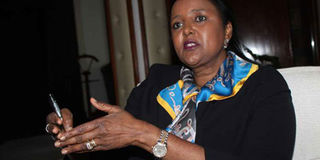Kenya will not accept to be dictated by ICC, says CS

Amina Mohamed, the Cabinet Secretary for the Ministry of Foreign Affairs and International Trade, in Nairobi on August 25, 2016. PHOTO | ANTHONY OMUYA | NATION MEDIA GROUP
What you need to know:
- Foreign Affairs Cabinet Secretary Amina Mohamed says Kenya will demand to be heard by the court before going to defend its position before the Assembly of States Parties’ meeting in November.
- In a new twist to the ruling referring Kenya to the assembly for failing to cooperate with Prosecutor Fatou Bensouda in a case involving President Uhuru Kenyatta, Ms Mohamed says the decision only asked the assembly to talk to Kenya.
NEW YORK
The Kenyan government has put on a brave face and vowed not to allow the International Criminal Court (ICC) to dictate to it, following a decision by The Hague on Monday to refer Kenya to the Assembly of States Parties (ASP).
Amina Mohamed, the Cabinet Secretary for the Ministry of Foreign Affairs and International Trade, said Kenya would demand to be heard by the court before going to defend its position before the assembly’s meeting in November.
In a fresh twist to the ruling referring Kenya to the assembly for failing to cooperate with Prosecutor Fatou Bensouda in a case involving President Uhuru Kenyatta, Ms Mohamed said the decision only asked the assembly to talk to Kenya.
“We have not been reported to the Assembly of States Parties. We have not been referred to the ASP as the media is saying. I met the ASP President who said the ruling doesn’t say so. The ASP President said the ruling encouraged him to talk to Kenya,” she said on the sidelines of the ongoing UN General Assembly meeting in New York, US.
She said she met Sidiki Kaba, the assembly’s president, who is also attending the UN meeting, and “he fished the ruling from his pocket” to correct the impression that has been made.
While stating that Kenya would comply with the referral, she, however, warned that it would not allow The Hague Court to bully it: “It is Kenya which created the ICC and not vice versa. We will not accept to be dictated to without being heard”.
PROVIDING DOCUMENTS
On Monday, the court’s trial chamber ruled that Kenya had failed to cooperate in its duties as a state member of the court in providing documents, which Ms Bensouda’s office had argued were at the core of the case against President Kenyatta.
“We disagree…we have cooperated with the ICC more than anyone else. We are discussing and we intend to pursue it to the end,” said the Cabinet Secretary.
The chamber said the ASP, which plays oversight over ICC, was the most suited institution to address the alleged failure Kenya to release the documents.
“Noting that the case against Mr Kenyatta has been already terminated and considering the relevance of the materials sought in the Prosecutor’s request to current or future investigations, Trial Chamber V(B) considered a referral to the ASP appropriate for the purpose of fostering cooperation more broadly for the sake of any ongoing and/or future investigations and proceedings in the Kenyan situation,” the trial chamber ruled.
Ms Bensouda, before withdrawing charges against President Kenyatta in December, 2014, accused the government of failing to provide documents, among them telephone records and bank accounts which she claimed could have helped her to prove the charges she brought against the head of State. The ICC rejected her request to declare Kenya was non-compliant and she opted to withdraw the case.
BE RELEASED
The government had opposed the request, arguing that it could have been prejudicial to President Kenyatta for the documents to be released.
In its ruling on Monday, the trial chamber said the prosecution had provided adequate evidence to warrant its request to refer Kenya to the ASP.
“It is additionally noted that, despite the passage of a further 18 months and notwithstanding the Kenyan government’s continuing statutory obligation to comply with any cooperation request from the Court, it appears that no further progress has been made in implementation of the Revised Request,” the chamber said.
President Kenyatta and his deputy William Ruto were accused of crimes against humanity by the ICC arising from the 2007-2008 post-election violence in which at least 1,333 people were killed and more than 600,000 ejected from their homes.
President Kenyatta’s case was withdrawn in December, 2014 and Mr Ruto’s case collapsed in April, this year.
On Wednesday, Ms Mohamed argued that Kenya “fully cooperated” with the ICC and said the government was making preparations to take up the ruling.
The Cabinet Secretary attacked the ICC, stating that it should prove its credulity by allowing Kenya to be heard.
“If actually the court is credible, we expect them to listen to us. We created it,” she said.
She said Kenya had made public its issues with the court and would use the ASP meeting to push for its case.





